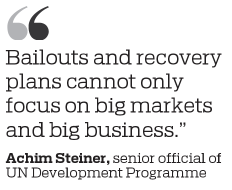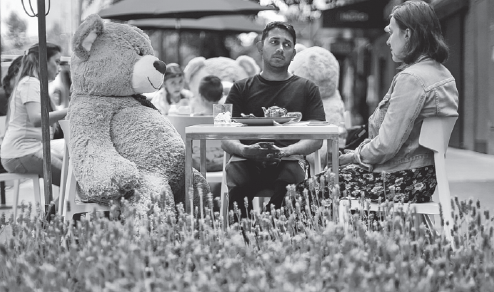Fresh spikes bring more clamps
As US tops 4 million cases, cities across planet adopt new curbs against virus

The coronavirus pandemic hit grim new milestones on Thursday, with cases topping 4 million in the United States and 3 million in Europe as fresh spikes from Belgium to Tokyo to Melbourne forced new restrictions on citizens.
While the European Union's lawmakers combed through a huge aid package for their economies, the United Nations called for a basic income for the world's poorest to help slow the spread of COVID-19.
The United States, the country hit hardest by the virus, added 1 million cases in just under two weeks, Johns Hopkins University reported on Thursday night. In the previous 24 hours alone, the country notched more than 76,000 new cases.
Having recorded more than 144,000 total fatalities, the United States has seen a coronavirus surge, particularly in southern and western states, as Texas, California, Alabama, Idaho and Florida all announced record one-day death tolls.
On the economic front, initial jobless claims rose for the first time in about four months as some states delayed or reversed reopening their economies amid the surge in infections, the US Labor Department said on Thursday.
First-time jobless claims increased 109,000 for the week ended on July 18 from the previous week to 1.416 million-the 18th consecutive week the total has been above 1 million. Economists surveyed by Dow Jones expected 1.3 million initial unemployment claims to be filed.
Against a backdrop of mass unemployment and sagging approval ratings, US President Donald Trump announced he was scrapping next month's Republican nominating convention in Florida, stating that it was not the right time to hold a "big, crowded" event.
Across the Atlantic, Europe now accounts for a fifth of the world's more than 15 million cases and remains the hardest hit region in terms of deaths, with 206,633 out of 627,307 worldwide.
Giant recovery plan
A 750-billion-euro ($870 billion) post-coronavirus recovery plan was hammered out at an EU conference this past week, where fiscally rigid nations butted heads with hard-hit countries like Spain and Italy that have called for huge aid grants.
European Council President Charles Michel said the total stimulus would eventually reach 1.8 trillion euros.
"This moment, it's my conviction, is pivotal in European history. We acted fast and with urgency," Michel told the bloc's parliament in Brussels.
Meanwhile, the UN warned that the world's poorest also need help.
Funding of $199 billion per month would provide 2.7 billion people with a temporary basic income and the "means to buy food and pay for health and education expenses", the UN Development Programme said.
"Bailouts and recovery plans cannot only focus on big markets and big business," said Achim Steiner, a senior UNDP official.
UN projections have warned the virus could kill 1.67 million people in 30 low-income countries.
Potential risks
There were signs the virus can quickly re-emerge when lockdown measures are lifted.
Australia, Belgium and the Japanese capital Tokyo all had early successes in containing outbreaks but are now facing an upsurge, prompting new restrictions.
Anyone venturing out in Australia's second-biggest city Melbourne will have to wear a mask. The same will be true in Belgium's outdoor markets and busy areas from Saturday.
"These measures are not advice; they are orders," Belgian Prime Minister Sophie Wilmes said.
In France, while the number of foreign tourists in Paris-the world's most visited city-has dwindled during a two-month lockdown, there has been a noticeable increase in homegrown visitors.
"Most clients are clearly French, with lots of families," said a spokesman for catering firm Sodexo, adding that the chic Jules Verne restaurant on the Eiffel Tower was booked solid every night in July.
And in India, the death toll from the virus overtook France's on Friday with 30,601 fatalities and nearly 50,000 new cases overnight, official data showed. The toll is the sixth-biggest behind those of the US, Brazil, Britain, Mexico and Italy, according to an Agence France-Presse tally. India has the third-highest caseload with almost 1.3 million infections.
Agencies, Scott Reeves in New York and Xinhua contributed to this story.































